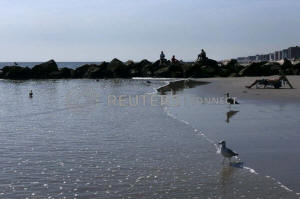|
U.S. Interior official suggests Trump
drilling proposal will include Atlantic: recording
 Send a link to a friend
Send a link to a friend
 [March 16, 2019]
By Nichola Groom [March 16, 2019]
By Nichola Groom
(Reuters) - The Trump administration is
likely to open up portions of the Atlantic to oil and gas drilling
despite opposition from East Coast states, a U.S. Interior Department
official suggested in remarks at a recent energy industry conference, a
recording of which was reviewed by Reuters.
The comments come as the administration of President Donald Trump
prepares to release a new five-year drilling plan proposal for federal
waters that could vastly expand available acreage, part of its broader
agenda to maximize U.S. oil, gas and coal production.
Interior's assistant secretary for land and minerals management, Joe
Balash, said in his speech that the department had been working to
permit seismic testing off the East Coast - noting that the department
would not have undertaken the work if the acreage was to be kept off
limits.
"I will tell you that we wouldn't work really, really hard to get
seismic permits out if it was an area that wasn't going to be
available," Balash said, according to a transcript of the recorded
remarks made at the International Association of Geophysical Contractors
annual conference in Houston on Feb. 20.

Responding to a question from the audience following his prepared
remarks, Balash said the proposal would likely "be drifting into the
second quarter of this year," as the department had underestimated the
amount of time the proposal would take.
His comments were first reported by The Guardian.
States from New England to Florida have expressed strong opposition to
offshore drilling and have asked the Trump administration to be exempted
from its offshore drilling plan, arguing the risk of an oil spill far
outweighs the promised jobs and revenues.
The Interior Department's Bureau of Ocean Energy Management is currently
reviewing nine geological and geophysical permit applications to allow
seismic testing in areas from Delaware to Florida, according to
documents on its website. Several states have sued to halt the effort.
Seismic testing, a precursor to drilling, uses air gun blasts to map out
what resources lie beneath the ocean - a practice that research suggests
hurts whales and other marine mammals.
[to top of second column]
|

A man sunbathes on the beach as seagulls stand in the Atlantic Ocean
in Long Beach, New York September 16, 2015. REUTERS/Shannon
Stapleton

When asked about Balash's comments at the energy conference,
Interior spokesman Russell Newell said the five-year drilling
proposal had not yet been completed.
"As Assistant Secretary Balash made clear and as BOEM Acting
Director Walter Cruikshank stated last week in Congressional
testimony, BOEM is still working on the proposed program documents,"
Newell said in an emailed statement.
"As these documents are yet to be finalized, no final decisions have
been made."
BOEM last year issued a draft proposal to open up over 90 percent of
coastal waters in the outer continental shelf to oil and gas
drilling, including areas like the Atlantic coast and California,
and said it would accept feedback before offering a final proposal
this year.
Shortly after announcing the initial proposal, former Interior
Secretary Ryan Zinke said he had agreed to exempt Florida. He also
told officials from at least six states that they would be "pleased"
or "happy" with the final plan, that the waters off their coastlines
do not have enough resources to make investment worthwhile, or both.
It is unclear whether those plans have been altered since Zinke
resigned in December. Trump nominated Zinke's deputy, David
Bernhardt, a former lobbyist, to replace him.
BOEM Director Walter Cruickshank last week said opposition to
offshore drilling was just one factor BOEM would consider in
drafting the revised proposal.
(Additional reporting by Valerie Volcovici, editing by G Crosse)
[© 2019 Thomson Reuters. All rights
reserved.]
Copyright 2019 Reuters. All rights reserved. This material may not be published,
broadcast, rewritten or redistributed.
Thompson Reuters is solely responsible for this content.
 |